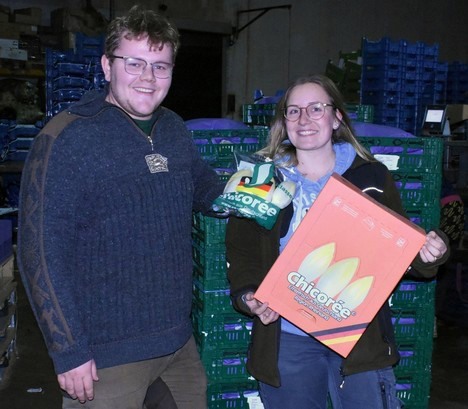This year's chicory root harvest got off to a rather slow start, according to grower Joseph Münch from Grafschaft-Gelsdorf. "The wet May meant we couldn't prepare any dams, which is why the whole thing was delayed until the beginning of June. After that, we had a long dry phase, during which the plants' emergence was unfortunately not optimal and we had to water them intensively."
In contrast to many other field crops, the rain in August favoured the growth of the plants, meaning that most of the produce has a normal diameter, continues Münch. "Overall, however, the root yield is around 20 per cent below last year's level and, compared to a bountiful harvest year, the crop is even half as large," explains Münch, who produces chicory roots on around 50 hectares.

In addition to chicory, Joseph Münch (pictured here visiting FreshPlaza in 2021) also produces stone fruit, pome fruit and soft fruit on 40 hectares. He also grows arable crops on his farm in Grafschaft-Gelsdorf.
Closure of the forcing plant
With a heavy heart, Münch decided to give up the farm's own chicory forcing plant in May 2023. "The reasons were clearly the rising energy prices and the associated cooling costs, especially during the summer months. Costs have more than doubled in a very short space of time. In 2021, the cooling costs were still 65 euros per large crate, but one year later we were already at 115 euros/crate," the grower calculates. The self-produced roots now go to a number of growers in Germany. "However, we will reduce root cultivation in the coming year, as other arable crops, especially sugar beet, are more attractive in terms of price."
Market prices for German chicory were slightly above the previous year's level last season, with demand remaining fairly stable. Münch: "However, this was also partly due to the lower root stock, which is why demand was far higher than the available supply from German production."
Labour shortage and rising wage costs
Overall, he takes a rather critical view of the future of speciality crop cultivation. "I see two parameters that are having a negative impact on sentiment, namely the low availability of labour coupled with rising minimum wages in Germany. In addition, the appreciation of regional chicory varies from retail chain to retail chain." The major producing countries continue to set the tone. "Here in western Germany, the more produce available in the Netherlands, Belgium and France, the worse it is for us."
For more information:
Joseph Münch
Münch Chicoree
Burgstr. 2
53501 Grafschaft-Gelsdorf
Tél. : +49 1573 8781221
joseph.muench@web.de
